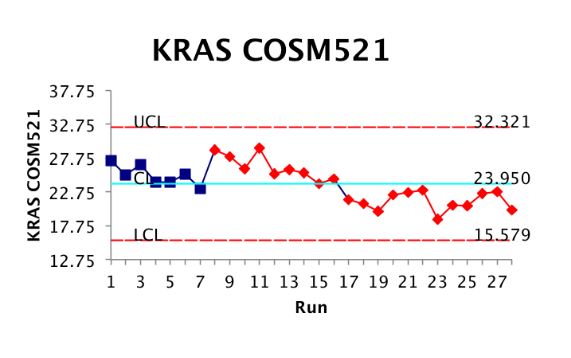The National Cancer Institute has started several significant clinical trials to confirm what is believed intuitively about precision medicine: that molecular characterization of tumors leading to personalized therapy may be more effective than standard cancer treatments. Announced in August of 2015, an NCI-sponsored effort called Molecular Analysis for Therapy Choice has 10 trial arms, with additional arms opening in April or May of 2016, with an ultimate goal of enrolling 3,000 patients. (More information about the MATCH trial can be found here.)

Image from Seraseq Solid Tumor Mutation Mix Technical Note.
Other efforts include the Lung Cancer Master Protocol (Lung-MAP) with a focus on squamous cell lung cancer (additional details found in this publication).
An effort called Adjuvant Lung Cancer Enrichment Marker Identification and Sequencing Trial (ALCHEMIST) also focuses effort on lung cancer, specifically addressing at an early stage of disease the significance of EGFR mutations and ALK rearrangements.
Another NCI-sponsored clinical trial, Molecular Profiling-based Assignment of Cancer Therapeutics (NCI-MPACT), aims to prospectively ask whether molecularly-guided therapy will determine benefit to patients.
The NCI-MPACT study began in early 2014, enrolling patients with both common and rare cancer types, and enrollment remains open. As part of this study, Dr. Paul (“Mickey”) Williams and his team at the National Cancer Institute recently published the results of their analytical validation of their NGS-based assay for use in patient selection as part of the M-PACT trial. Their assay, based upon the Thermo Fisher Scientific Ion Torrent PGM platform and a custom Ion AmpliSeq assay, covers 380 actionable mutations across 62 genes (383 amplicons). They assessed sensitivity, specificity, and reproducibility across five variant types: single-nucleotide variants (SNVs), SNVs at homopolymeric regions, small insertion/deletions (indels), large indels greater than 4 base-pairs, and indels at homopolymer regions. As part of assay development, a positive-control DNA sample was generated called ‘Control Plasmid Spike-in CEPH DNA’ (CPSC) carrying 27 actionable mutations at 10% allele ratio to wild-type CEPH DNA (NA12878), and assessed for copy number by TaqMan real-time quantitative PCR.
This is the “first report that details the analytical validation process of an NGS-based assay for use as an integral assay in a clinical study.” The NCI team reported sensitivity of 100% for 64 SNVs, 9 SNVs in homopolymers, and 11 large indels; a sensitivity of 83.3% for six indels, and 93.3% for 15 indels in homopolymer regions. In addition, they had 100% specificity in all 380 actionable mutations using HapMap cell lines.
Lih CJ, Sims DJ, Harrington RD, Polley EC, Zhao Y, Mehaffey MG, Forbes TD, Das B, Walsh WD, Datta V, Harper KN, Bouk CH, Rubinstein LV, Simon RM, Conley BA, Chen AP, Kummar S, Doroshow JH, Williams PM. Analytical Validation and Application of a Targeted Next-Generation Sequencing Mutation-Detection Assay for Use in Treatment Assignment in the NCI-MPACT Trial. J Mol Diagn. 2016 18(1):51-67. doi: 10.1016/j.jmoldx.2015.07.006. PubMed PMID: 26602013.
If you are interested in similar material to the Control Plasmid Spike-in CEPH DNA (CSPC) referred to in the paper, we offer the Seraseq™ Solid Tumor Mutation Mix in a range of allele frequencies across 26 common hotspot mutations. More information can be found here.




